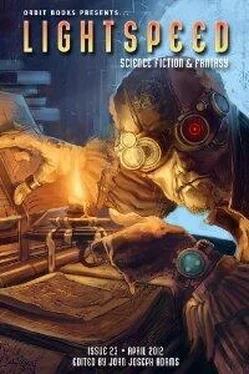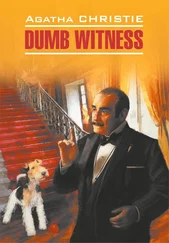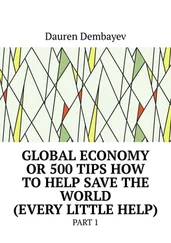“You’re a murderer and a rapist, and there may be no hope for you,” Winnie says to Ryan on a rainy afternoon at the end of the story. “But if there is, I will find it. I will remake you.”
Ryan doesn’t reply. He didn’t know he was a murderer and a rapist until very recently, so there is nothing to say. Nothing except the obvious words: It was only because I loved you , but Winnie would probably respond to that by breaking his arm, so he does not say it.
Instead, he stares at the rain dripping through a broken place in the roof. They are in an old warehouse down by the river, a place he bought yesterday. He paid for it with a check from his leather-covered checkbook, probably the last one they will let him write.
After buying the building, Ryan took the bucket of ashes out of the trunk of his green Lexus. With a shaking hand, he scattered them everywhere, over the floors, the walls, the windowsills. The ash rose up in great billowing clouds, choking him, mingling with his tears to make a gritty paste that he licked off his lips.
And now, after everything, he and Winnie are both stretched out on a stained mattress that they found by the back door, drinking from a bottle of vodka with a torn label. She looks just as she did when he first met her, immense ass and too-tight tank-top and all. Gone are the gray silk suit, the perfect teeth, the vacant stare. Now she just is what she is, nothing more or less. She has won.
This is where the story ends, but it is not where it begins.
The story begins on Ryan Ceres’ 40th birthday.
* * *
Ryan Ceres’ birthday is the 40th anniversary of what has been, and promises to continue to be, a perfect life.
He is a real-estate developer. He drives a green Lexus and he listens to adult contemporary rock. His fingernails are manicured and his hair is the color of fresh honey. His eyes are as blue as the sun shining through ice.
He is celebrating the anniversary of his birth with his fiancée, a slender redhead in a gray silk suit. They are having dinner at a restaurant on the top floor of the tallest building in town. His fiancée is staring down at a salad that is composed of two delicate leaves of arugula, a lump of herb-crusted goat cheese and a garnet-colored curl of shaved beet. She is heartbreakingly beautiful in a thoroughly banal way.
Ryan, however, has long since ceased to notice what she looks like. He is staring past her, out the tall black windows at the city below. Like jewels set in rich fabric, his buildings glow up at him. They beam up at him adoringly. They love him and he loves them. They are his real dinner partners. They are the ones with whom he is sharing his birthday dinner.
He raises his wineglass to the window, blowing them silent imaginary kisses.
* * *
At twenty, with a substantial endowment from a bachelor uncle who foresaw greatness in his young nephew’s cobalt blue eyes, Ryan started with old houses. Victorians, bungalows, foursquares, modernes; he fed on plaster dust and linseed oil. When he turned thirty, he went looking for a larger challenge and found it in the red-and-gold heart of Chinatown: the Gorham hotel, built in 1911. Eighty rooms of drunks and addicts. A wreck, a noble heap, a disaster with possibilities. He brought in his men, brutally efficient Russian laborers, and set them to work tearing the place apart.
In one room they found hundreds of empty methadone bottles wedged under a floorboard, and hundreds of old hypodermics quivering in the ceiling above, flung like the pencils of schoolchildren, a garden of upside-down glass flowers. In another room, a room that smelled of mothballs and old-man liniment, dozens of dust-crumbling girlie magazines had been stuffed behind the wall. Stuffed there to block a draft? To avoid embarrassment? It didn’t matter. His Russians burned them with all the rest of the moldering yellow insulation. They stripped away rotting lath and horsehair plaster and put in smooth fresh drywall and expensive bamboo flooring, and when they were finished, the Gorham Hotel featured eighty ultramodern studios with brushed metal refrigerators and cultured marble cooking islands. Only the best.
It made him his first million, a million that has expanded and contracted many times since, expanding with capital inflows, contracting to meet expenses, expanding and contracting, like a great beating heart, pushing new blood through old buildings.
The old bank that he turned into lawyer’s offices. The old department store that he turned into a mini-mall. The old brewery that he turned into a brewpub. And, most recently, the old flour mill, reclaimed from the dull-eyed clowder of Hispanic squatters living in her labyrinthine basements, that he turned into twenty-thousand square feet of quaint little shops selling arugula, herb-crusted goat cheese, and organic beets. The proprietors of these little shops will make good money. Ryan will make nothing. His net profit on the deal is a satisfyingly round figure. Zero.
Each building he takes on is a little bigger, each rehab a little more lovingly detailed, each project a little less profitable. There is a delicious purity in this that he relishes. It is not the money he desires. The money is nothing, only a tool to purchase goat-cheese and arugula for the empty-eyed cipher sitting across the table from him. The real satisfaction comes from the knowledge that he has made his buildings clean and pure, burned the filth of ages from their bones, scoured them of the unseen impurities time breeds. He has uncovered chimneys full of dead birds; the skeleton of a cat wedged between two wall studs; decaying piles of rat-shit in ancient ventilation ducts. He has exposed obscene secrets and expunged them.
Quite suddenly, Ryan feels extremely pleased with himself. An erotic charge of satisfaction surges through his body. He looks lustfully at his fiancée, somewhat surprised to find that she is still there.
Her hair shines, her face is perfect, her nails gleam, her skin is smooth as glass. The relationship between her and the curl of beet she is contemplating is entirely without entropy, a universe which has long since ceased to expand. She is as self-contained as an egg.
The electricity charging his nerves dissipates abruptly, and his sudden elation is replaced by an equally sudden feeling of irritation. He puts down his fork heavily. The sound of silver on porcelain makes her look up.
“Why would they put a curl of beet on the salad?” she sneers melodiously. “No one likes beets.”
“Some people obviously do,” he says, flashing her one of his sandpaper grins designed to smooth out rough patches.
He’s perfected these grins, he uses them often. It helps to grin, he’s noticed, even when you feel like tearing someone’s throat out.
Life has apparently taught her the same lesson. A polite, fleeting smile dances across her lips, replaced quickly by a pretty little frown as she returns to her contemplation of the despised curl of beet.
* * *
It is Ryan’s 40th birthday.
He gives his fiancée a good-night peck and doesn’t wait for the elevator doors to slide shut before he turns and walks away. His fiancée must be in bed by 11 p.m. precisely, for she must be at the gym early the next morning to exorcise any fatty demons the arugula and goat cheese may have introduced into her pure corpus. She is utterly composed of routine and habit; if she is not in bed by 11 p.m. precisely, she might start breaking things. The moment his lips leave the cold flesh of her cheek, he ceases to think about her. She ceases to exist.
He goes back into the restaurant, to its clean elegant bar filled with fresh-looking young people. The counter is made of zinc and there are cobalt-blue vases with yellow gerbera daisies in them. He sits, drinking steadily, the zinc cooling his elbows.
Читать дальше












